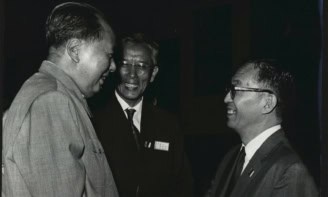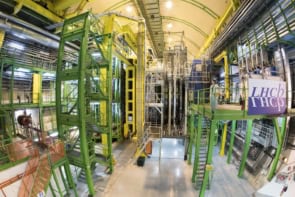Rolf-Dieter Heuer will find himself thrust into the spotlight when he becomes boss of CERN next year

Some jobs in physics are better than others. Working a seven-day week installing sensors on an oil rig in Azerbaijan, as one physicist writing in Physics World recently described having to do, is perhaps not as rewarding as, say, studying the atmosphere of Venus (see “Venus: our non-dentical twin”), creating new “thermal” transistors based on the flow of heat rather than electrons (see “Phononics gets hot”), or devising new ways to make ships invisible (see “Invisibility rules the waves”). But according to Rolf-Dieter Heuer, who is currently research director for particle and astroparticle physics at the DESY lab in Hamburg, he will have “the best job in physics” when he replaces Robert Aymar as director-general of the CERN particle-physics lab near Geneva next January (see “Full steam ahead”).
Being CERN boss — 15 people have so far held the post — has always been one of the top jobs in physics. It is not a job that anyone ever applies for: as is common when big labs look for new heads, candidates are “proposed” by a search committee and a shortlist is interviewed by members of the CERN council. But with the lab’s Large Hadron Collider (LHC) — the biggest experiment ever in physics — set to smash its first protons together this summer, the job will be better than ever, particularly for an experimentalist like Heuer.
Taking charge just as the first real data from the LHC start pouring in, Heuer will be in the hot seat at a great time, with scientists and the public itching for signs of the Higgs boson, the particle that can shed light on the origin of mass. But therein lies the challenge. Particle physicists “sold” the LHC as a Higgs-spotting machine, and if it takes years for reliable evidence of the particle to turn up, then the long delay could leave politicians wondering if the LHC was a wise investment.
Another problem for Heuer will be deciding what to do if hints of a Higgs leak out before physicists are certain of the result, which could lead to a dirty priority battle fought out in the media. He is wise therefore to try to forestall this possibility by following Fermilab’s lead in introducing guidelines on how researchers should use personal blogs to discuss new data. Even more tricky for Heuer, though, will be if the LHC turns up nothing new at all. Apart from forcing particle physicists to rethink the Standard Model, finding nothing could leave Heuer having to defend the LHC from accusations that it is the world’s most expensive white elephant.
Other challenges on Heuer’s plate will be to plan for the LHC’s upgrade in 2015 and to ensure that CERN plays a greater role in the proposed International Linear Collider (ILC), which — if funded — would make precision studies of the Higgs boson, assuming that it is found at the LHC. If CERN wins the race to host the ILC — the lab has its own variant known as the Compact Linear Collider, or CLIC — its victory could give the lab an unhealthy dominance in high-energy physics, with labs like Fermilab and DESY having to scale back their work in this area. Only the KEK lab in Japan seems to be going from strength to strength in particle physics.
Thankfully for Heuer, who will serve a five-year term, that particular problem will probably be one that his successor will have to deal with. In the meantime, Heuer should expect the unexpected. He is after all dealing with a machine of unprecedented complexity on which thousands of physicists are pinning their careers. Heuer will need to be at his best to make the most of the “best job in physics”.



